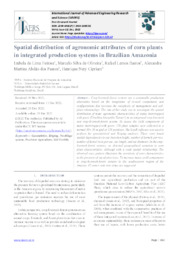Spatial distribution of agronomic attributes of corn plants in integrated production systems in Brazilian Amazonia.
Spatial distribution of agronomic attributes of corn plants in integrated production systems in Brazilian Amazonia.
Author(s): FEITOSA, I. de L.; OLIVEIRA, M. S. de; PASSOS, A. M. A. dos; CIPRIANI, H. N.
Summary: Crop-livestock-forest systems are a sustainable production alternative based on the integration of several components and configurations that increase the complexity of management and soil-plant relationships. The aim of this study was to investigate the spatial distribution of many agronomic characteristics of maize intercropped with grass (Urochloa brizantha 'Xaraés') in an integrated crop-livestock and crop-livestock-forest system. To assess the yield components of maize intercropped with grass, 120 plant samples were collected in a normal 30 x 30 m grid at 120 positions. The GeoR software was used to perform for geostatistical and Kriging analyses. There were found spatial dependencies in ear insertion height, number of kernels per row, number of kernel rows per ear, ear length, and ear diameter. In the crop-livestock-forest systems, we detected geographical variation in corn plant characteristics, although with a weak spatial relationship. The observed wavy pattern illustrates the sensitivity of corn characteristics to the presence of eucalyptus trees. To increase maize yield components in crop-livestock-forest systems in the southwestern region of the Amazon, 42-meter-wide tree strips are suggested
Publication year: 2022
Types of publication: Journal article
Unit: Embrapa Maize & Sorghum
Keywords: Geostatistics, Kriging, No-tillage system, Precision agriculture, Soil fertility
Observation
Some of Embrapa's publications are published as ePub files. To read them, use or download one of the following free software options to your computer or mobile device. Android: Google Play Books; IOS: iBooks; Windows and Linux: Calibre.
Access other publications
Access the Agricultural Research Database (BDPA) to consult Embrapa's full library collection and records.
Visit Embrapa Bookstore to purchase books and other publications sold by Embrapa.

